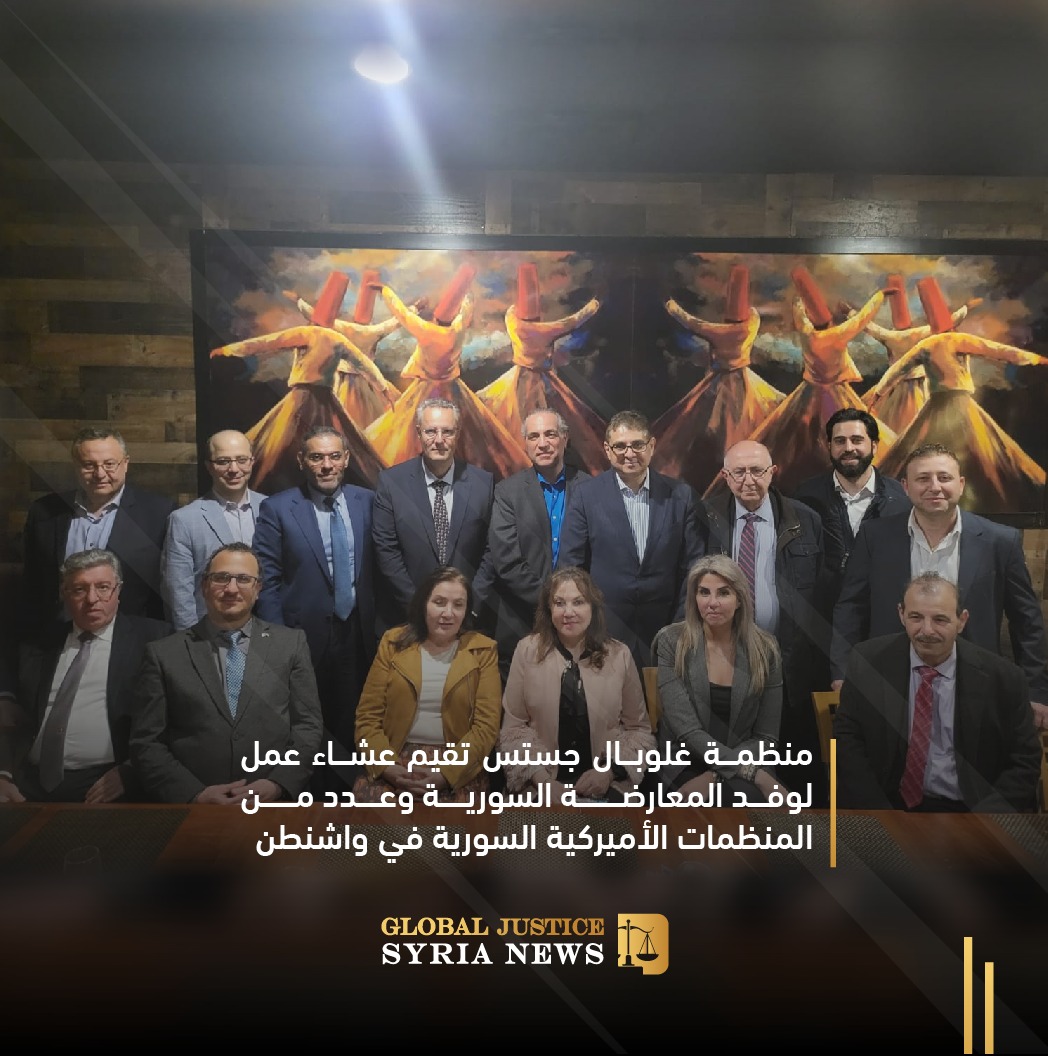Global Justice Syria News – Washington – Exclusive:
Global Justice held a working dinner in Washington, the capital of the United States, last Friday evening with a delegation from the Syrian opposition and some representatives of American-Syrian organizations. The head of the Syrian American Organization, Dr. Haytham Albizem welcomed the participants and stressed that what unites them is the only position that rejects the tyrannical Assad regime.
The participants included Sheikh Salem Al-Muslat, chairman of the Syrian National Coalition, as well as Badr Jamous, chairman and former chairman of the negotiation committee, lawyer Anwar al-Bunni, Anas al-Abdah, Vice-President Maissa Kabbani. Global Gates, negotiation committee member Fadwa Ajili, Arab Democratic Alliance executive body member, Alia Natfji, George Stifo and researcher Essam, Khoury, Global Gates Executive Director Dr. Samir Al-Taqi, President of Freedom Trail Organization Hisham Nashawati, President of the “Syrian Liberal” Party Bassam Quwatli, media figure and politician Ammar Abdel Hamid and member of the Syrian American Council and Syrian American Alliance Dr. Tariq Abu Ghazaleh. A delegation from the Syrian opposition came to the US capital Washington last Tuesday to discuss the Syria file and revive the political process.
According to the negotiation team’s tweet on “Twitter”, the following are on the agenda of the delegation:
Interviews with members of the House of Representatives and American think tanks. The Commission noted that these meetings “come within the framework of the Commission’s efforts to put the political solution on track with the Syrian regime in light of the wave of normalization”. The negotiating team said that “by rejecting normalization, which puts an end to the hopes of the Syrian people to achieve freedom and the rule of law, they conveyed the just demands of the Syrian people to the American administration and expect the Syrian people to hold the regime accountable.” For the hundreds of crimes committed against them.”
It was emphasized that pressures and practices that increase the victimization of Syrian refugees in neighboring countries should be avoided and that the refugee file is primarily a humanitarian aid file. Attention was also drawn to the seriousness of what happened in Lebanon and the serious violations against Syrian refugees, who cost their lives due to their surrender to the regime.
The opposition delegation also urged the US administration to find solutions to protect and assist Syrian refugees in light of the military conflict in Sudan.
US Deputy Secretary of State Barbara Leaf reiterated the US position on Syria and its refusal to normalize relations with the Assad regime.
The US State Department reported that Lev met with the Syria negotiation committee to confirm that the US policy on Syria has not changed.
He stressed that there is no normalization with the Assad regime unless there is strong support for Security Council Resolution 2254, including permanent political change and the role of the Syrian opposition.
The opposition delegation’s visit included meetings with the Syrian community in the US, a symposium at the Hoover Center in Washington, and several meetings in the US Congress. The delegation, which met with witnesses who are known as the gravediggers of the Assad massacres and presented their witnesses to the US authorities, also visited the Arab Center in Washington and met with a number of US officials.
At the dinner party, which lasted for more than two hours, the participants exchanged views and perceptions about the political reality and future of the Syrian issue. Albizem stated that it is time to work seriously to unite the vision of the Syrian opposition, which refuses to normalize with Assad and remains committed to the goals of the Syrian revolution, and expressed his readiness to do everything possible to achieve peace. While this goal once again kept the promise of the Syrians, Al-Ajili complained about the absence of a leadership in the current political arena that could bring the popular base together.
Al-Khoury criticized the Syrian opposition for changing faces while maintaining the same personalities, and Jamous said the coalition’s age as an institution is about 12 years, when it has presided over 14 presidents. Al-Bunni criticizes what the Syrian opposition considers to be unsuccessful regarding Syrians’ affairs, pointing to the need to emphasize a secular state in the future, while Al-Taqi noted that the current climate requires more wisdom in dealing with Syrians. Without directing the Syrian file and various opposition figures with arrows of criticism and treason, regardless of their level, these characters and their weaknesses emphasize the need to reach a comprehensive umbrella for Syrians, rather than the disintegration situation experienced by all Syrians. Various aspects that recall the experience of the Palestinian revolution and the similar stages and complexities of the Syrian revolution that intersect with what is going through it.



















